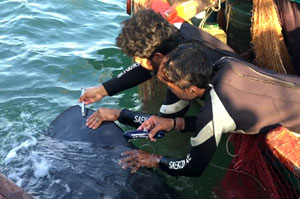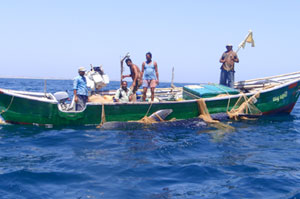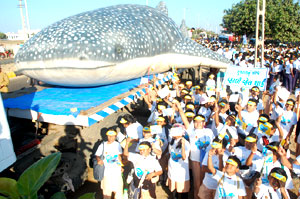How a giant fish became a favoured daughter
Tata Chemicals’ Save the Whale Shark Campaign has given a fresh lease of life to the endangered species and turned fishing communities along the Saurashtra coast in Gujarat its guardians

The whale shark is the largest fish in the world. The gentle giant was once slaughtered along the Saurashtra coast in large numbers for its oil and meat. This led to a steep decline in the fish population and it was declared an endangered species in 2001. Tata Chemicals launched the ‘Save the Whale Shark Campaign’ in 2004 with an aim to:
- Make the endangered whale shark a species protected and revered by the fishing community along the Saurashtra coast.
- Bring about an end to the whale shark trade in Gujarat and ensure long-term survival of the fish.
- Establish a scientific database about the whale shark to help in devising strategies for its long-term survival.

The project is being implemented in partnership with the Wildlife Trust of India and the Gujarat Forest Department, with support from the fishing communities in the Veraval, Sutrapada and Dhamlej region. The programme was able to garner support from ‘Shri Morari Bapu’, a popular spiritual leader, who became the brand ambassador. Shri Morari Bapu created whale shark conservation linkages with Indian traditions in his discourses. What helped change the mindset of fishing communities was his comparison of the whale shark’s return to the Saurashtra coast to a daughter returning to her maternal home (‘maike’) for childbirth and his questioning as to how can the people think of slaughtering her when the local culture preaches care and protection of the daughter and her baby? ‘Vhali’ or the “dearest one” was the name given to the whale shark to arouse an emotional bond with the fish. The whale shark has now been repositioned as the ‘Pride of Gujarat’.

The Save the Whale Shark Project’s achievements include:
- Whale shark hunting along Saurashtra coast has been stopped completely. The communities which once hunted this fish have now turned guardians and protectors.
- Since the inception of the project, a total of 720 whale sharks which were caught in fishing nets have been voluntarily released by fishermen, making this project one of the largest rescue and release programme for a large marine fish.
- A whale shark rescue and release protocol has been established and the Gujarat Forest Department has institutionalised a process to pay monetary relief to fishermen for net damages incurred during whale shark rescues.
- Whale Shark Day celebration has been institutionalised by the State Forest Department to create conservation awareness.
- Pioneering work has been done to establish a scientific database on whale shark migration, genetics and habitat studies.
- The project has won the National Green Governance Award in 2005, has been recognised as ‘Good Environment-friendly Practice of Gujarat’ in 2012 by the state government and been awarded the ‘India Biodiversity Award’ by UNDP in 2014.